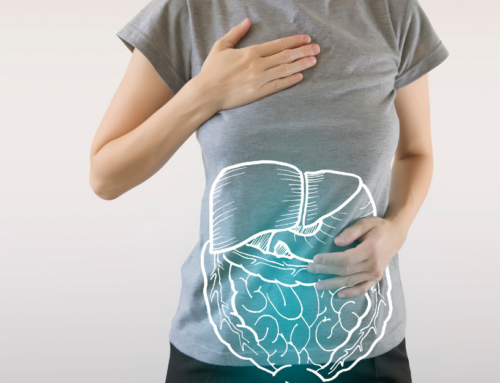Many of us are making plans for a happy, healthy, and fulfilling year and investing in the tools to make that happen. However, January’s shorter days, colder temperatures, and reduced time outside put many people at risk for seasonal affective disorder (SAD). Studies show that people who experience SAD have lower levels of the neurotransmitter serotonin – one of our happy hormones! Chronic depression, anxiety, obsessive-compulsive disorder, and social anxiety are also linked to lower levels of serotonin.
In addition to supporting a positive mood, serotonin also plays an important role in nutrient absorption and digestion which is why maintaining adequate serotonin levels is crucial not only for mood but also for supporting a healthy digestive system!
Let’s take a look at some natural ways to improve serotonin levels to make this your best year yet – both physically and mentally!
The Role and Production of Serotonin
Serotonin is a “happy hormone” that plays a big role in mood regulation. As a neurotransmitter primarily found in the brain, it acts as a key player in managing emotions and influencing feelings of well-being and happiness. Serotonin helps transmit signals between nerve cells, impacting various brain areas involved in mood regulation.
Low levels of serotonin have been associated with conditions like depression and anxiety disorders, suggesting its significance in maintaining a balanced and stable mood. When serotonin levels are adequate, it promotes a sense of calmness and contentment, contributing to an overall positive mood and emotional balance.
But, its functions don’t stop there! Serotonin also plays a role in cardiovascular activity, energy balance, and even digestion.
In cardiovascular activity, it helps regulate blood vessel constriction and dilation, impacting blood pressure. Additionally, serotonin contributes to energy balance by affecting appetite, food intake, and metabolism, thereby influencing weight regulation. Moreover, in digestion, serotonin plays a role in coordinating gut movements and influencing sensations like fullness and pain, demonstrating its involvement in digestive processes.
Where is serotonin produced in the body?
To appreciate the impact of changes in serotonin levels, it’s important to look at its origin in the body. Serotonin is produced in the brain and, you may be surprised to learn that, about 95% of serotonin is produced in the gut!
In the brain, it’s synthesized by neurons, while in the gut, it’s primarily produced by enterochromaffin cells in the intestinal lining.
Because of this, serotonin plays a crucial role in orchestrating communication between the gut and the brain and influences many aspects of gut function, including sensations of pain and feelings of fullness. This helps explain its role in promoting good digestion, and why irritable bowel syndrome and leaky gut syndrome are often associated with serotonin levels. It also points to the importance of a healthy gut microbiome in improving serotonin levels and offers an excellent starting point for restoring serotonin levels.
The Signs of Low Serotonin Levels
Here are the most common symptoms of low serotonin to watch out for:
- Sleep disturbances. Both insomnia and oversleeping are linked to serotonin imbalances.
- Loss of appetite
- Depression
- Anxiety and social anxiety
- Chronic unexplained pain
- Problems with focus and memory
- Obsessive-compulsive disorder
- Leaky gut and irritable bowel syndrome
How to Increase Serotonin Naturally
Now that we know how serotonin functions and just how important it is, here are some simple lifestyle changes that can have a positive impact on serotonin levels.
1 – Focus on foods high in tryptophan
Serotonin is derived from the amino acid tryptophan. Good food sources of tryptophan include:
- Tofu
- Turkey
- Tilapia
- Salmon
- Pumpkin seeds
- Quinoa
- Oats
Some research suggests that tryptophan is better absorbed when consumed with carbohydrates. Focus on high-quality carbs like whole grains, sweet potatoes, and other root vegetables.
2 – Eat a gut-healthy diet
Given the close link between gut health and serotonin regulation, it’s important to maintain a healthy balance of gut bacteria. Probiotic foods help maintain a balance of bacteria by encouraging the growth of good bacteria, so don’t forget fermented food and drinks like sauerkraut, kefir, and kombucha.
A well-balanced diet of anti-inflammatory foods will support the natural production of serotonin. Choose foods like fresh fruit, colorful vegetables, and leafy greens. Salmon, avocados, nuts, and olive oil are also good sources of anti-inflammatory healthy fats.
3 – Exercise
Numerous studies point to the positive impact physical activity has on serotonin. Steady-state aerobic exercise shows the best results for most people but the focus should be on activities you enjoy as you’re more likely to stick to an exercise program if you like it!
4 – Get outside
Just 10 to 15 minutes in the sun can have a positive impact on serotonin production. Of course, that can be challenging for some of us at this time of the year with gloomy days and cold weather. However, research shows that time in nature has a similar effect, so even on a cloudy day, a walk anywhere outdoors is good for serotonin levels.
5 – Seek supplement support
Sometimes our bodies could use a little extra support and that’s where supplementation comes in. Work with a healthcare practitioner to create the best supplementation plan for you. Too much serotonin can be harmful, so you want to achieve the right balance.
Here are some supplements that might help.
- 5-HTP (5-Hydroxytryptophan) is an amino acid that plays a role in serotonin production. Your body produces 5-HTP naturally, so supplements are generally a safe approach to improving your mood.
- By replenishing your gut microbiome, probiotics support serotonin levels.
- S-Adenosylmethionine (SAMe) supports serotonin production by providing a vital building block that aids in the synthesis of serotonin in the brain, contributing to improved mood and emotional well-being.
Understanding the significance of serotonin in influencing mood, digestion, and overall well-being empowers us to take proactive steps. By working together, we can formulate a personalized plan tailored to boost your serotonin levels and enhance your overall health and happiness in the coming year. Give us a call if you’re interested in getting started!
Sources:
Brenda Mc Mahon, Sofie B. Andersen, Martin K. Madsen, Liv V. Hjordt, Ida Hageman, Henrik Dam, Claus Svarer, Sofi da Cunha-Bang, William Baaré, Jacob Madsen, Lis Hasholt, Klaus Holst, Vibe G. Frokjaer, Gitte M. Knudsen, Seasonal difference in brain serotonin transporter binding predicts symptom severity in patients with seasonal affective disorder, Brain, Volume 139, Issue 5, May 2016, Pages 1605–1614, https://doi.org/10.1093/brain/aww043
Appleton J. The Gut-Brain Axis: Influence of Microbiota on Mood and Mental Health. Integr Med (Encinitas). 2018 Aug;17(4):28-32. PMID: 31043907; PMCID: PMC6469458.
Lin SH, Lee LT, Yang YK. Serotonin and mental disorders: a concise review on molecular neuroimaging evidence. Clin Psychopharmacol Neurosci. 2014 Dec;12(3):196-202. doi: 10.9758/cpn.2014.12.3.196. Epub 2014 Dec 26. PMID: 25598822; PMCID: PMC4293164.
Kikuchi AM, Tanabe A, Iwahori Y. A systematic review of the effect of L-tryptophan supplementation on mood and emotional functioning. J Diet Suppl. 2021;18(3):316-333. doi: 10.1080/19390211.2020.1746725. Epub 2020 Apr 10. PMID: 32272859.
Roth W, Zadeh K, Vekariya R, Ge Y, Mohamadzadeh M. Tryptophan Metabolism and Gut-Brain Homeostasis. Int J Mol Sci. 2021 Mar 15;22(6):2973. doi: 10.3390/ijms22062973. PMID: 33804088; PMCID: PMC8000752.
Baker DE. Rationale for using serotonergic agents to treat irritable bowel syndrome. Am J Health Syst Pharm. 2005 Apr 1;62(7):700-11; quiz 712-3. doi: 10.1093/ajhp/62.7.700. PMID: 15790796.
Young SN. How to increase serotonin in the human brain without drugs. J Psychiatry Neurosci. 2007 Nov;32(6):394-9. PMID: 18043762; PMCID: PMC2077351.
Sansone RA, Sansone LA. Sunshine, serotonin, and skin: a partial explanation for seasonal patterns in psychopathology? Innov Clin Neurosci. 2013 Jul;10(7-8):20-4. PMID: 24062970; PMCID: PMC3779905.
Park BJ, Shin CS, Shin WS, Chung CY, Lee SH, Kim DJ, Kim YH, Park CE. Effects of Forest Therapy on Health Promotion among Middle-Aged Women: Focusing on Physiological Indicators. Int J Environ Res Public Health. 2020 Jun 17;17(12):4348. doi: 10.3390/ijerph17124348. PMID: 32560522; PMCID: PMC7344639.
Kikuchi AM, Tanabe A, Iwahori Y. A systematic review of the effect of L-tryptophan supplementation on mood and emotional functioning. J Diet Suppl. 2021;18(3):316-333. doi: 10.1080/19390211.2020.1746725. Epub 2020 Apr 10. PMID: 32272859.
Maffei ME. 5-Hydroxytryptophan (5-HTP): Natural Occurrence, Analysis, Biosynthesis, Biotechnology, Physiology and Toxicology. Int J Mol Sci. 2020 Dec 26;22(1):181. doi: 10.3390/ijms22010181. PMID: 33375373; PMCID: PMC7796270.






